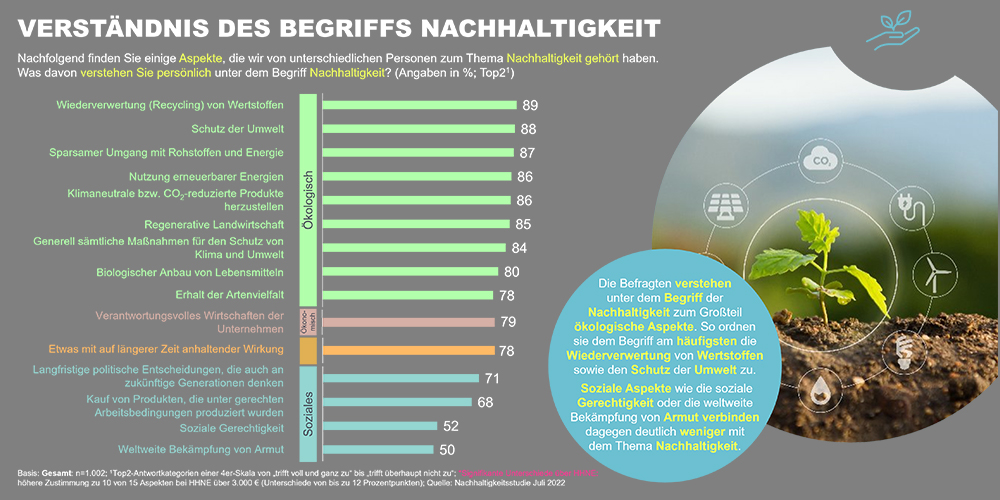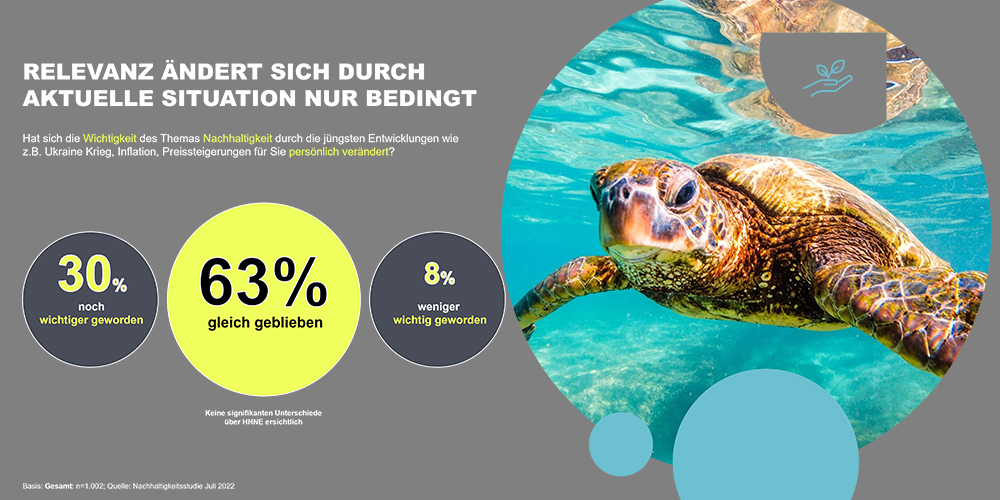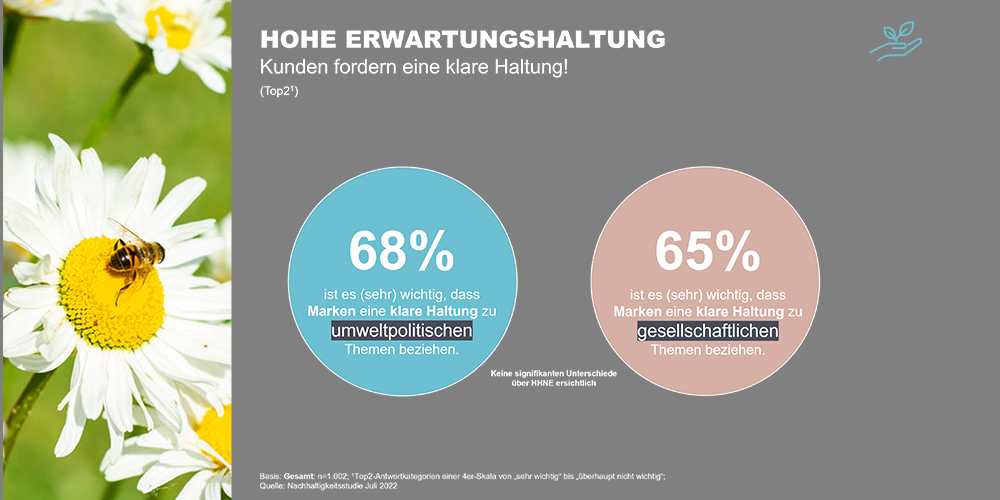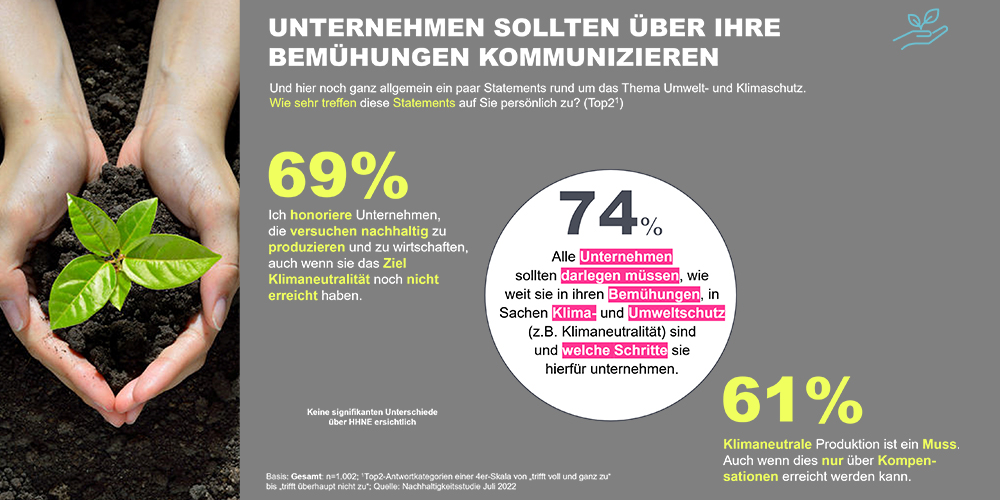![[Translate to En:]](/fileadmin/Assets/04_News_Research/image/studie_stimmungsbild_nachhaltigkeit-news-header.jpg)
Is the mood in Germany changing? Is sustainability still important to Germans? Or is simply saving money now the priority? How important is it for companies to take a position on these issues and make it clear where they stand? And what are expectations do consumers have of companies in terms of producing their products in an environmentally friendly way? The latest ‘population-representative sentiment’ study on the importance of sustainability, taking inflation, the rising cost of living, the war in Ukraine and other factors into account,provides answers to these questions and many more. The study was exclusively conducted by Tanja Seiter and her team from Burda’s market research department Media Market Insights GmbH.
Let’s get straight to brass tacks: 86 per cent of respondents consider sustainability to be ‘important’ or ‘very important’. Only 14 per cent pay less attention to the issue, deeming it ‘less important’ or ‘not important at all’.
The current situation with the war in Ukraine, inflation and the rising cost of living only have a limited impact on how important those surveyed view the issue. This can be seen in the fact that the aspect of sustainability has become ‘even more important’ for 30 per cent of the respondents and only eight per cent state that it is ‘less important’ for them at the moment. More than 60 per cent consider the issue to be no more or less important than before.
Consumers have high expectations of companies
The study clearly shows that the topic of attitude (referred to as ‘purpose’ in marketing terms) is one of the most important factors in how people perceive a company’s image. This means that purpose is a critical element for consumers, and it is one that they expect to see in a company if they are to trust it. According to the participants surveyed, purpose (along with all its environmental and social facets) should take precedence over the pursuit of profit, especially in times of crises. If companies do not meet consumers’ high expectations and align with their purpose values, then consumers are also very willing to boycott them. As expected, inflation and the rising cost of living is putting more ‘pressure to save’ in terms of spending on lower income groups than on consumers with a higher net household income. Nevertheless, there is a not inconsiderably large group that is (still) unmoved by inflation and continues to consume and buy as before.
Seals provide guidance and inspire consumer confidence
A large majority of those surveyed believe that companies should make it clear how far they have come in terms of climate and environmental protection.Seals provide guidance and are so important that more than one in two people spend more money on products with a seal. More than 70 per cent of the respondents believe that they support climate protection by buying products with seals.
High affinity for sustainability among print readers
The study also shows that there are significant differences between print readers and the overall sample in terms of how they view sustainability. For 36 per cent of print readers, the issue has become even more important despite recent developments, which is significantly above the value of all respondents. Print readers have a sound knowledge of the multitude of aspects that the term sustainability encompasses. Significantly more respondents are confident that they can explain the term correctly. Print readers place even more value on a company’s active commitment to environmental protection when buying products. European/German production sites play a key role in this. In terms of current consumer behaviour, seals (such as organic, Fairtrade, climate neutrality) have a higher status among print readers. In contrast, inflation is currently less of a problem for print readers. More than half are not deterred from making major purchases by inflation.
Sustainability – a much-used term that needs to be explained
The term ‘sustainability’ is on everyone’s lips – and almost every company today has to deal with making sure their business meets sustainability requirements. Despite this, not everyone is certain what the term actually means. Eight per cent do not think that they are able to explain the term correctly. Half of those surveyed say that they would not really feel confident in explaining ‘sustainability’ without being able to look it up beforehand. Even so, 42 per cent feel confident in their ability to identify the concept of sustainability correctly.
When asked what they had heard about sustainability or what they personally understood the term sustainability to mean, they gave a range of responses. ‘Recycling valuable materials’ (89 per cent), ‘protecting the environment’ (88 per cent) and ‘using raw materials and energy economically’ (87 per cent) were the top answers. Environmental factors were not the only answers given – economic factors, such as companies following ‘responsible business practices’, as well as social factors such as ‘social justice’ (52 per cent) and the ‘global fight against poverty’ (50 per cent), were also among the responses.
You can download the study, which contains a lot of detailed information on the most important aspects of buying products, on the effect of seals and consumer attitudes in marketing as well as on the impact that inflation has on the issue of sustainability, in full here:



